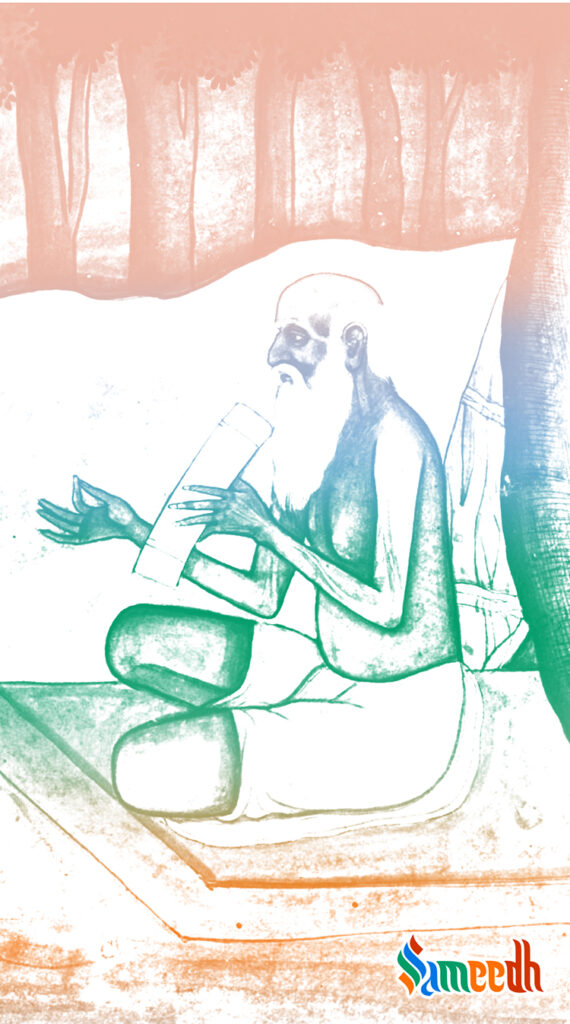Rishi Angiras is one of the Sapt-Rishis, who is credited with writing numerous Vedic poems. He is also credited with authoring the majority of the Atharv Ved, together with the Rishi Atharvan.

Who was Rishi Angiras?
Angiras Rishi is one of the Manas Putras (mind-born sons) of Brahma dev. The most interesting narrative concerning Angiras Rishi is the one about how he earned the place of Agni by undertaking penance. According to history, ‘tapas’ enabled Rishi Angiras surpass Agni dev in brilliance. Angiras’s brilliance illuminated the entire cosmos. As an alternative to Agni, people began to worship Angiras.
Rishi Angiras’s penance
Angiras Rishi is one of the Manas Putras (mind-born sons) of Brahma dev. According to history, ‘tapas’ enabled Rishi Angiras surpass Agni dev in brilliance. Angiras’s brilliance illuminated the entire cosmos. As an alternative to Agni, people began to worship Angiras. Agni dev went away into hiding from the world, after being unable to tolerate this disrespect. Rishi Angiras was brilliant, yet he was unable to manage the fire. The only one who could command fire was Agni. With Agni’s disappearance, living beings had to deal with a lot of issues. Rishi Angiras soon realised that attempting to become Agni was not a correct move. Then, Rishi Angiras proceeded to meet Agni, where he was sheltering and begged his pardon. Rishi Angiras was pardoned by Agni, who then regarded Rishi Angiras as his first son. As a result, Angiras became Agni’s son.
Rishi Angiras’s fight with demin named ‘Panis’
In other versions, Rishi Angiras is also described as one of the Sapt-Rishis, who were both manifested by Brahma at the commencement of the present Manvantar. According to the Rigvedic hymns Indra dev gave Rishi Angiras numerous cattle as a gift after he freed them from a demon known as Panis, who had been holding them captive. Being a descendant of the Angiras tribe, the Buddha is sometimes referred to in Buddhist writings as Angiras or Angiras Kumara. Devguru Brihaspati was Rishi Angiras’s first child, according to the Rig Veda. As mentioned earlier, Rishi Angiras had a number of distinguished descendants, many of whom were also kshatriyas and went by the name Angiras.
Rishi Angiras’s contribution to the Veds
Rishi Angiras is credited with writing numerous Vedic poems. He is credited with authoring the majority of the Atharv Ved, together with the Rishi Atharvan. The Mundaka Upanishad mentions one of the accounts about Rishi Angiras. Saunaka, a householder, went to the jungle carrying his firewood, where Rishi Angiras was hiding. “O great Rishi, show me that through which the entire universe could be known”, he pleads as he approaches the Rishi with devotion. The two distinct types of knowledge on this universe are further described by Rishi Angiras. He said that science, mantra chants, customs, language, art, astrology, etc. are among the lower forms of knowledge. The wisdom that leads a person to something which never dies is the higher knowledge, which can never be destroyed or taken away.
Descendants of Rishi Angiras and their sacrifices
Brihat Keerti (Utadhya), Brihat Jyoti (Samvart), Brihat Brahma, Brihan Manas, Brihan Mantra, Brihat Bhanu, and Brihaspati are the seven sons that Angiras had in response to Brahma’s wish. Bhanumati, Raka, CineeVali, Mahishmati, Ekaneka, and Mahamati Archishamati were his other seven daughters. According to a belief, Samvart is still wandering the Varanasi jungles and hasn’t yet departed his mortal body. According to reports, he appears more like a stone-throwing maniac who would harm anyone who tried to approach him. On the contrary, those who seek his enlightenment will benefit from his divine blessing and be liberated. All of the Rishis descended from Samvart have been given the last name ‘Angiras’ or ‘Angir’. The most well-known descendant of this lineage is Rishi Vyas, since he is responsible for creating new Vedic mantras through intense penance and passing them on to successive generations for their welfare.
The verses of the Atharvaved are known as ‘Angirasas’, and the Angiras family was assigned a special duty to guard the sacrifices made in accordance with the Atharvaved. They were given the distinguishing name ‘Atharvangirasas’ due to this reason, or maybe because they were associated with Atharvan’s ancestors.
